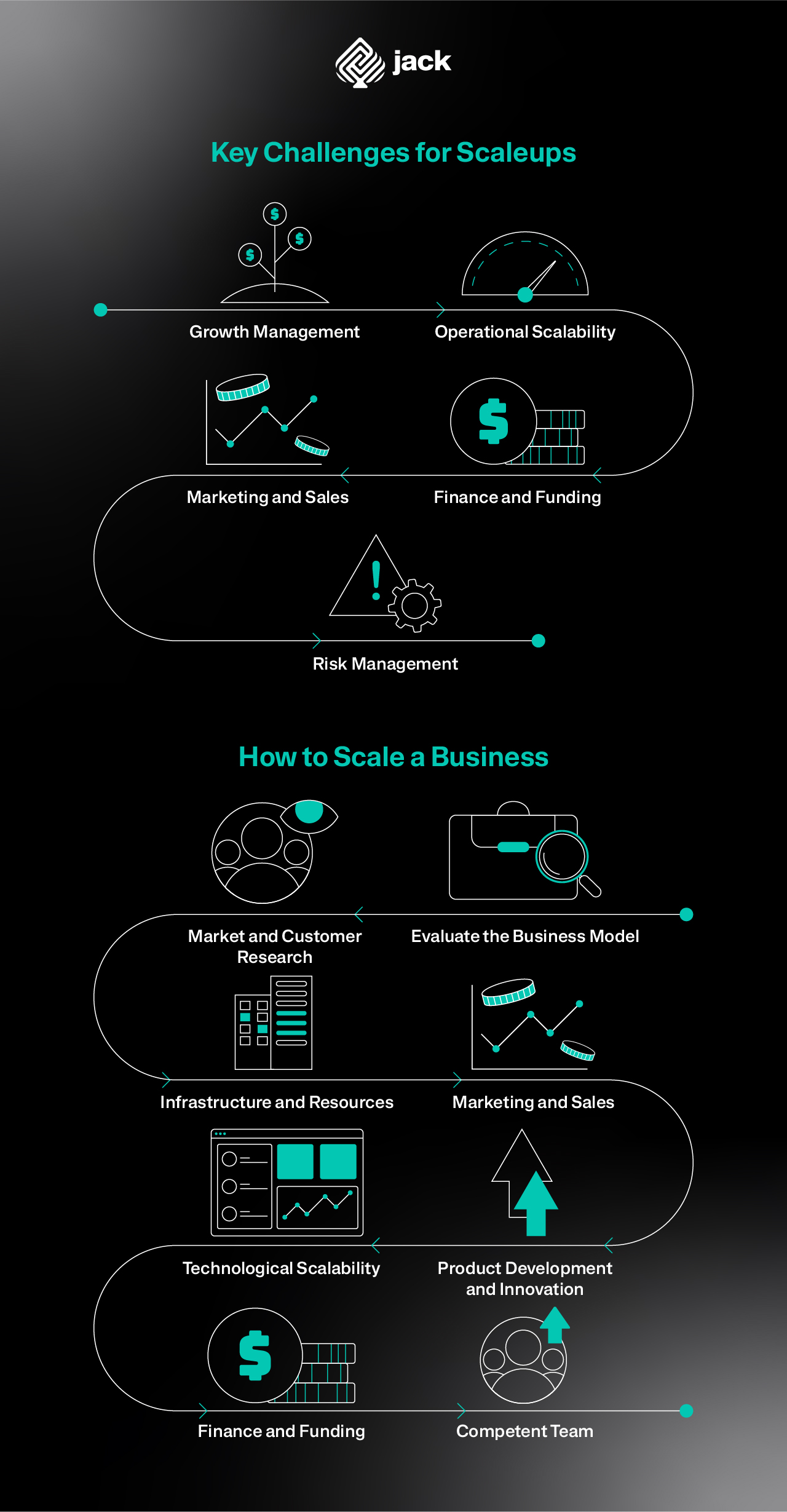Growth and scalability are two important concepts in business. Growth refers to the increase in size or expansion of a business in terms of revenue, profits, the number of employees, and the served market share.
On the other hand, scalability refers to a business’s ability to increase revenue without the need for proportional increases in resource utilization.
What are their roles in the business? Find out the answers in this article!
Growth vs Scalability
Sustainable success is the ultimate goal for every business owner. However, along the journey, questions often arise about what strategies to employ. Two of them are business growth and scalability. Both have the same goal of achieving business success and progress but with different approaches.
Business growth is an effort to gradually increase the size, scale, and performance of the business. The main focus of growth is on expanding the number of employees, revenue, market share, and geographic expansion. In a growth strategy, the company will allocate additional resources to achieve greater outcomes.
Stable growth indicates that your business is capable of competing in a competitive market. By increasing market share, you can attract more customers and create a competitive advantage. Good growth can also increase the value of the company, attract investor interest, and open up opportunities for future expansion.
However, business growth also carries risks. Unplanned resource additions or poor management can result in low efficiency and high costs. Therefore, a well-thought-out strategy is needed to effectively manage growth.
On the other hand, scalability is the ability of a business to increase revenue without a proportional increase in resource utilization. In this case, the company seeks ways to enhance operational efficiency, optimize business processes, and deliver added value to customers by using existing resources more efficiently.
One of the main advantages of scalability is its ability to create exponential growth. By leveraging technology, automation, or easily expandable business models, you can experience rapid and significant growth without the need for proportional resource increases.
Scalability allows you to expand the geographic reach of your business, introduce new products or services, or even drastically change your business model. With scalability, you can navigate growth challenges more flexibly and take the necessary steps to achieve sustainable growth.
For the success of your company, there is nothing wrong with combining both concepts to create a successful business. Growth and scalability are not conflicting concepts, so their combination can be the key to sustainable business success.
When developing your business strategy, it is important to consider planned and controlled growth. You can set realistic growth goals, evaluate the necessary resource needs, and manage changes carefully. However, don’t forget to also consider scalability elements in your planning.
By adopting scalability as part of your business strategy, you can enhance operational efficiency, optimize resource utilization, and provide added value to customers. By doing so, you can achieve higher and sustainable growth without being trapped in static or limited growth.

What are the Differences and Why does its Matter?
Nowadays, particularly in the modern business world, innovative ideas are being considered more important. It is not uncommon for many investors to be optimistic about investing their money in the ideas offered by startups.
When these ideas are successfully executed with funding from investors, startup businesses usually experience growth in terms of the number of employees, revenue, and the market share they serve. Growth is a common goal for companies as it can generate profits and increase the company’s value. Good growth indicates that a business is expanding and successfully facing competition.
On the other hand, scalability refers to a business’s ability to increase revenue by utilizing existing resources more efficiently. One key difference between growth and scalability in business lies in the total resources and revenue generated.
In a growth strategy, a business needs to offer high resources with fixed revenue. However, when you implement business scalability, your revenue will exponentially grow along with resource savings.
1. The Volume of Business Growth
Business growth has a significant impact on your business plan’s structure. As your business grows, changes in strategy, required resources, and business focus become crucial. Additionally, the growth obtained can have characteristics that are static or fixed, where the business reaches its limit to continue growing within the same framework.
In contrast, scalability offers the opportunity to completely change the game. Scalability allows you to grow into a large business by exponentially increasing your growth without sacrificing the resources you have. Through scalability, you can transform your business structure, improve operational efficiency, expand geographical reach, or introduce new products or services. This helps you overcome previous growth limitations and achieve higher and sustainable growth levels.
2. Scalability Systems Enable Self-Management of Companies
While business growth is measured as a single entity, scalability analyzes various factors. Many newly established businesses often overlook the importance of having a clear structure, and they tend to become overwhelmed when facing rapid growth.
Scalability teaches you how to sustain your business with higher return on investment while utilizing fewer resources. When a company experiences rapid growth, it often struggles to self-manage in emergency situations. However, businesses that implement scalability can face profits or losses with more composure and control.
3. Risk Management
Business growth brings unplanned risks because we often remain unaware of factors that can affect the level of success or failure. However, when you decide to implement business scalability, risk management becomes a form of protection for your company’s success.
Scalability helps you stay focused on critical tasks without sacrificing resources or revenue. When companies aim to reduce risks through scalability, comprehensive risk assessments are also necessary. Therefore, scalability can help you better cope with risks compared to a growth strategy. Moreover, it will facilitate future expansion as well.
4. Recurring Customers and Revenue
When observed exclusively, a company’s growth is based on acquiring new customers. However, implementing business scalability can help create sustainability by attracting repeat customers.
The combined result of standardizing the business and creating repetitive processes through scalability makes your business efficient and swift. As a result, you can generate recurring revenue by establishing repeated actions more easily.
From the above differences, it can be concluded that the main difference between growth and scalability lies in the approach to achieving improvement. Growth involves proportional resource increases to enhance business profits, while scalability increases profits without the need for proportional resource increases.
Startup vs Scaleup
Startup and scaleup are two terms commonly used in the business world that relate to the stages of company growth. Although these two terms may sound similar, there are significant differences between them.
A startup is a newly established company that operates in the early stages of development. Typically, startups are founded by a group of individuals who have innovative ideas to solve specific market problems. The primary goal of a startup is to test the validity of the business idea, develop products or services, and seek funding from investors. The main focus of startups is to create unique products with rapid growth potential.
Usually, startups operate with a small and flexible team, with an informal organizational structure. They often face various challenges such as resource limitations, market uncertainties, and intense competition. However, with innovative approaches and a willingness to take risks, startups can grow into successful companies.
When a startup achieves significant growth, it can become a scaleup. Scaleup is a stage where a company already has proven successful products or services in the market and focuses on large-scale business expansion. The primary goal of scaleups is to increase revenue and achieve a larger operational scale.
The main difference between startups and scale-ups lies in the growth stages and business focus. Startups focus on testing business ideas and developing innovative products, while scaleups focus on expanding successful businesses. Scaleups have more resources and stability, enabling them to better tackle growth challenges.
Scaleups usually involve increasing the workforce, expanding into new markets, diversifying products or services, and significantly increasing revenue. They are also more likely to seek funding to support larger growth. In the scaleup phase, it is important to have a solid business plan, effective marketing strategies, and scalable operational systems.
In conclusion, startup and scaleup are two different stages of business growth. Startups are focused on testing business ideas and developing innovative products, while scaleups are focused on expanding proven successful businesses. Understanding the differences between these concepts and having strategies appropriate for each stage of company growth is crucial in building a successful business.
Key Challenges for Scaleups
Moving from a startup to a scaleup involves facing several challenges for the scaleup company. Some of these challenges include:
1. Growth Management
Rapid growth puts pressure on various aspects of the company, including organizational structure, systems, and existing business processes. The company must effectively manage growth and ensure that all parts of the organization remain coordinated and operate smoothly.
2. Operational Scalability
Scaleup companies need to rapidly increase their operational capacity in proportion to their growth. This can be achieved by optimizing business processes, expanding infrastructure, and adopting appropriate technologies to improve operational efficiency.
3. Finance and Funding
Another challenge for scaleup companies is the need for significant capital investment for rapid growth. Therefore, scaleup companies must manage their finances wisely and seek additional sources of funding, such as external financing through venture investment, loans, or funding generated from profits.
4. Marketing and Sales
At this stage, companies also need to enhance their marketing and sales efforts to reach a broader market. The challenge for the company is to develop effective marketing strategies, expand the sales team, and build strong relationships with customers and partners.
5. Risk Management
Lastly, during the scaleup stage, companies need to have a robust risk management system. For example, the company must be able to identify, understand, and mitigate risks associated with growth and operational expansion.
The key to success for a company in the scaleup stage is the ability to wisely and proactively address these challenges. It is important for the company to have a well-thought-out plan, a strong team, and good adaptability to overcome obstacles and leverage growth opportunities.
How to Scale a Business
Scalable business growth is a goal for many business owners. Scalability refers to a business’s ability to increase revenue and expand without a proportional increase in resource utilization. It allows companies to achieve rapid and sustainable growth while maintaining a competitive advantage in a continuously evolving market. Here are some ways that can help you develop scalable business growth:
1. Plan Thoroughly
The first step in developing scalable business growth is to have a well-thought-out plan. This involves identifying long-term and short-term goals and the strategies to achieve them. The plan should include market analysis, identification of growth opportunities, and proper resource allocation. With a focused plan, you can prepare your business for scalable growth by anticipating challenges and taking necessary steps.
2. Focus on Operational Efficiency
Operational efficiency is often closely tied to business scalability. Look for ways to improve efficiency in all aspects of your business, from production and logistics to marketing. Utilize technology and automation to optimize business processes and reduce costs. By enhancing operational efficiency, you can allocate resources more effectively and avoid unnecessary wastage, creating a strong foundation for scalable growth.
3. Emphasize Innovation
Innovation is key to achieving scalable growth. Seek opportunities to develop new products or services that meet customer needs or enter new markets. Maintain strong relationships with customers and stay informed about emerging industry trends. Think outside the box and be willing to take risks to create added value for your business. Continuous innovation will strengthen your position in the market and enable scalable growth.
4. Customer Focus and Feedback
Customers are valuable assets in scalable business growth. Listen to customer feedback, evaluate their needs, and find ways to better meet them. Provide excellent customer service to ensure customer satisfaction. Satisfied customers will return and potentially recommend your business to others, helping expand your customer base and achieve scalable growth.
5. Build Strategic Partnerships
Building strategic partnerships with business partners can help develop scalable growth. Therefore, seek partners who have expertise or resources that complement your business.
Partnerships can involve collaboration in product development, joint marketing efforts, or expansion into new markets. Also, make sure to choose partners aligned with your company’s values and vision. Strategic partnerships can provide access to additional resources, broader market knowledge, and greater growth opportunities. By leveraging the right partnerships, you can develop scalable business growth faster and more effectively.
6. Harness Technology and Digitalization
Technology and digitalization have become key drivers in developing scalable business growth. Therefore, do not hesitate to leverage modern technology to enhance efficiency, automate business processes, and increase productivity. Implement digital marketing strategies to reach more potential customers and expand your business’s reach. By leveraging the right technology, you can achieve scalable growth more cost-effectively.
Additionally, you can develop scalable business growth by learning from data and analytics. Both can be valuable assets in developing scalable business growth. Use them to understand market trends, customer behavior, and your business’s needs. In-depth data analysis can help identify growth opportunities, address weaknesses, and make smarter decisions.
7. Maintain Quality and Reputation
Scalable business growth should not be compromised by reducing product or service quality. Therefore, consistently maintain quality and provide a satisfying customer experience. Build a good reputation through a commitment to excellence, integrity, and good service.
By maintaining good quality and reputation, you can retain existing customers, attract new ones, and support scalable business growth.
8. Evaluate and Adjust Strategies
Lastly, it is important to regularly evaluate your business strategies and make adjustments if necessary. Monitor market developments, competition, and evolving industry trends. If there are new opportunities or challenges, be willing to change your strategies accordingly. Flexibility and adaptability are key to developing scalable business growth.
Use Jack for your business needs
See also video tutorials from financial and business from Jack.
By following the above steps, you can develop scalable business growth and create a solid foundation for long-term success. Scalability allows your business to grow rapidly and sustainably, effectively navigate challenges, and capitalize on growth opportunities in the market.
That’s some information about the importance of growth and scalability in business. Hopefully, the information is beneficial to you!






